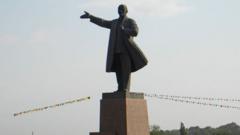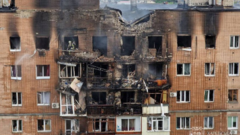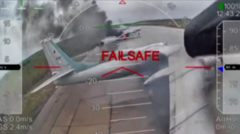Crimea's strategic importance continues to manifest as Ukraine targets key infrastructure, disrupting the relative peace experienced by Russian visitors. The geopolitical implications linger as the region seeks to navigate its complex identity and security concerns amidst ongoing conflict.**
The Strained Shores of Crimea: A Region Under Siege and Isolation**

The Strained Shores of Crimea: A Region Under Siege and Isolation**
A look at the evolving situation in Crimea as Ukrainian drone attacks create a reality of uncertainty for residents and tourists alike.**
The picturesque region of Crimea, once a vibrant meeting point for travelers from Ukraine and Russia, now finds itself grappling with the implications of ongoing warfare. The backdrop of beautiful beaches is overshadowed by the fear of Ukrainian drone strikes, which have become a regular occurrence. In the past month alone, Ukraine has reportedly executed multiple drone attacks aimed at the critically important bridge to Crimea, utilizing underwater explosives in recent maneuvers.
This bridge, functioning as the main supply route between the Russian mainland and Crimea, has seen increased closures in the wake of the attacks, complicating life for residents and visitors. A Telegram channel specifically cautioned motorists against crossing due to potential threats from Ukrainian attacks, which often awaken the long-standing tensions of the region.
Since Russia's annexation of Crimea in 2014, the peninsula has transformed significantly, becoming a focal point of conflict as it intersects different historical narratives and cultural identities. Moscow's defense of its annexation revolves around a sense of correcting historical grievances, urging that any settlements post-conflict should ensure recognition of their claim. Conversely, Ukraine stands firm in its assertion of sovereignty over Crimea, rejecting any notion of abandonment.
International relations play a notable role in the evolving conversation. High-level discussions, including remarks from former President Trump, propose the possibility of U.S. recognition of Russian sovereignty over Crimea as a facet of potential peace negotiations, opening another layer of contention regarding the region's fate.
Despite the ongoing conflicts, some locals adhere to a mentality characterized by the sentiment "Crimea is Ours," often downplaying the significance of these conflicts as mere inconveniences. This encapsulates a division in perspectives, where the serene coastal scenery contrasts deeply with the harsh realities of geopolitical tensions.
The future of Crimea remains uncertain as drone attacks challenge its stability, limit tourism, and underscore a heightened sense of volatility in a region struggling to define its identity amidst a larger narrative of war.






















